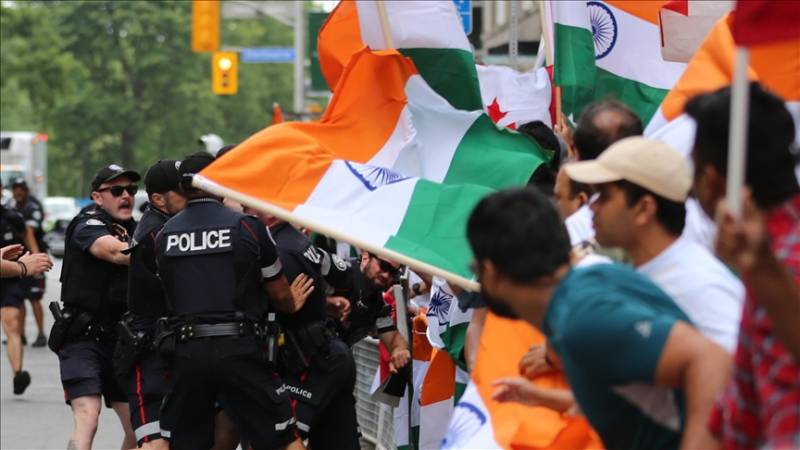
Decades ago, fear loomed on the doleful streets of Delhi. An eerie kind of terror was let loose with the active complicity of the state. Members of the Sikh community were running for life from pillar to post. Their houses were burned. Their shops were set ablaze. The chances to exist and subsist were fast eroding. The shrieks of mourning mothers and wives over the corpses of their dear ones reached a crescendo. Such was the dismal state of affairs in Delhi in 1984 just on the heels of gory “Operation Blue Star” aimed at dismantling the Khalistan Movement by assailing the revered Golden Temple in Amritsar.
It’s said that memories carrying the burden of coffins – which were meant to live in free environs – die hard. With these heavy images in their brains, a large number of Indian Sikhs had to move out of India to North America, Australia and the United Kingdom to exercise their rights to free living. The new soils also embraced the aggrieved class. They started their lives afresh, bestirred in new ways of life. Canada is now home to the largest Sikh population outside India, with about 800,000 people who report Sikhism as their religion.
But all this while, the painful memories of 1984 couldn’t be scratched off the canvas!
India has time and again demanding that authorities in Canada take action against Sikhs who support Khalistan – a separate independent state for the Sikh people to be carved out of Indian Punjab. But Canada, with bilateral trade with India worth $8.16 billion in 2022-23, always requires credible evidence to initiate proceedings against the people of the Sikh community. The recent standoff between the two countries arose when the Canadian Prime Minister Justine Trudeau told the House of Commons that there were credible allegations that New Delhi was potentially behind the killing of Hardeep Singh Nijjar on June 18, outside the Guru Nanak Singh Gurdawara in Surrey, an area in Western Canada.
The point to ponder is that this allegation on India was by no means the outcome of an off the cuff state of mind, rather a well thought out step, reasonably based on credible evidence of Indian agencies’ involvement into the murder. The information is provided by the intelligence sharing alliance called “Five Eyes.” The US ambassador to Canada, David Cohen, told CTV that there “was intelligence among Five Eyes partners that helped lead Canada to making the statements that the Prime Minister made.” In another interview with CBC, Canadian Defence Minister Bill Blair said that “Canada has very credible intelligence that causes us to be deeply concerned” about a murder on Canadian soil. That is why they took three months before making the clear charge of India’s involvement. Now the question arises: what on earth emboldened India to go to this extent, with the tangible threat that such a murder on a foreign land might cause diplomatic humiliation to India.
The answer is that India feels quite puffed up over the period of last ten years because of certain factors. Firstly, India’s growing ties with the US, with the desire to make the former a geopolitical counterweight to Chinese influence in the Indo-Pacific, has considerably encouraged the Modi government to pursue the whims which otherwise could not even be cogitated by present day Congress led by the accommodating Rahul Gandhi.
Secondly, ever since the Modi regime settled on the seat of power in New Delhi, it, being overwhelmed with the vision to build a nationalist image of India where hardcore values of Hindutva must reign, having the least regard for minorities, has been crushing dissent from those who dare criticize its authoritarian ways. The West have hitherto shut their eyes to rights violations of minorities in last 9 years.
Thirdly, it goes without saying that India has taken up a rapid journey towards being an economic powerhouse, which promises to attract business ventures from other economies of the world. Sometimes, states also tend to shrug off foibles when it comes to bigger financial gains to be made with particular countries. Modi, whom India’s external agency, RAW, directly reports to, must have ignored the fact that killings of minorities and the garlanding of the murderers by his party men may be permissible in India, but not on western lands, where the rule of law cannot turn a blind eye to the heinous murders of their citizens.
Fourthly, India’s exploits of killings on foreign lands are motivated because of vicious murderous ploys adopted in regional countries with impunity. India has been promoting unrest in Pakistan, Bangladesh, Nepal and Afghanistan. The capture of in-service RAW agent in Pakistan, Kulbhushan Jadhav is an example in this regard. The spy has confessed to Indian involvement into many terror attacks in Pakistan, taking hundreds of innocent lives.
This case now is a litmus test for western liberal democracies. India, no doubt, is a big market to them. It has recently hosted the G20 Summit, and is a member of the Quadrilateral Security Dialogue (Quad) comprising of the US, Japan and Australia as its other members. It is a strategic partner to the US, Australia and many other western states, with numerous defence and trade deals. Notwithstanding all these deals & pacts, it is yet to be seen if the rule of law, as embedded in western democracies wins, or the money-spinning compromises yield to fiscal realities.

